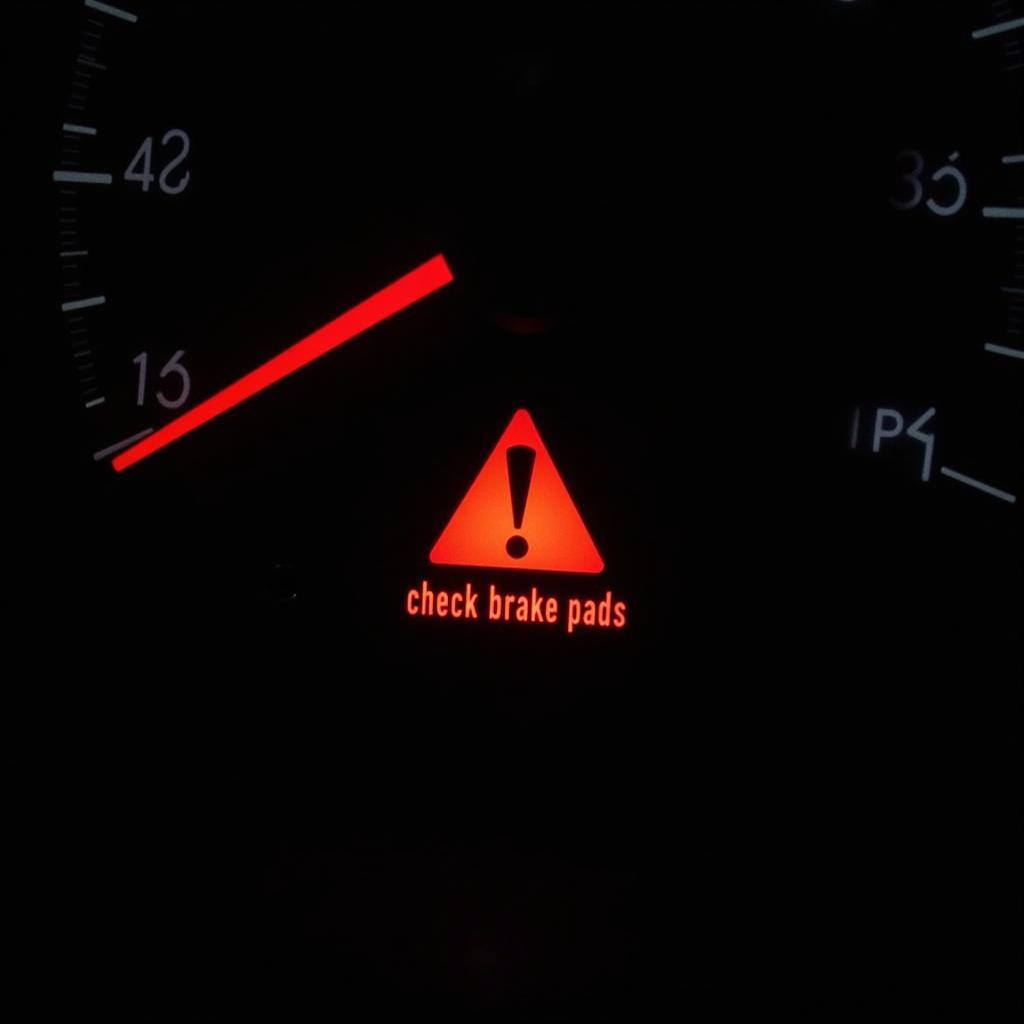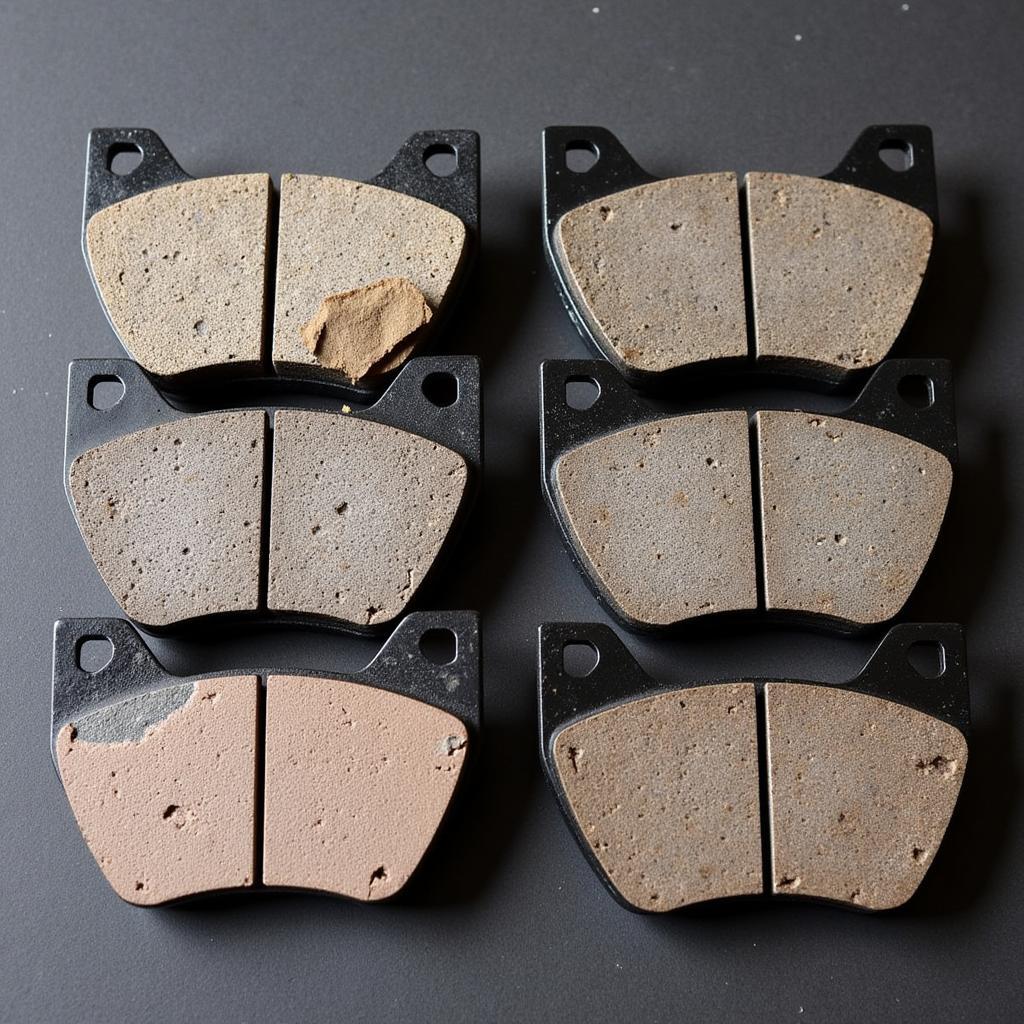The dreaded “check brake pads” warning on your VW dashboard can be a real pain. It usually pops up just as you’re about to head out, leaving you wondering what’s wrong and how much it’ll cost to fix. Don’t worry; we’re here to help you navigate this common VW issue.
Understanding the VW Brake Pad Warning Light
Your VW is equipped with a sensor that constantly monitors the thickness of your brake pads. When the pads wear down to a certain level, the sensor triggers the “check brake pads” warning on your dashboard.
This warning is your car’s way of saying it’s time for a brake inspection. Ignoring this warning can lead to further damage and expensive repairs down the line.
Common Causes of the “Check Brake Pads” Warning
While worn brake pads are the most common culprit, several other factors can trigger the warning light:
- Worn Brake Pad Sensors: The sensor itself might be faulty or damaged, triggering a false warning.
- Damaged Brake Pad Wiring: A short or break in the wiring harness connected to the sensor can also cause the warning.
- Extremely Low Temperatures: In some cases, extremely cold weather can temporarily affect the sensor’s readings.
Diagnosing the Problem: What to Do When the Warning Appears
 VW Brake Pad Warning Light Dashboard
VW Brake Pad Warning Light Dashboard
- Check Your Owner’s Manual: Your VW owner’s manual will provide specific information about the brake pad warning system for your model.
- Inspect Your Brake Pads: If you’re comfortable doing so, you can visually inspect your brake pads for wear. Look for a thin lining of pad material remaining on the metal backing plate.
- Schedule a Professional Inspection: If you’re unsure or uncomfortable inspecting the brakes yourself, it’s best to schedule an inspection with a qualified mechanic specializing in VW vehicles.
The Importance of Addressing the Issue Promptly
Addressing the “check brake pads” warning promptly is crucial for your safety and the longevity of your VW:
- Safety: Worn brake pads compromise your car’s ability to stop effectively, increasing the risk of accidents.
- Cost Savings: Addressing the issue early can prevent further damage to your brake rotors, calipers, and other components, saving you from costly repairs down the road.
Can I Still Drive with the “Check Brake Pads” Warning On?
While you might be tempted to continue driving with the warning light on, it’s not recommended. Driving with worn brake pads can significantly reduce your stopping power and put you and others at risk.
“Think of your brake pads like the soles of your shoes,” says master VW technician, Hans Schmidt. “Just like worn-out soles can lead to slips and falls, worn-out brake pads can lead to dangerous driving situations.”
 Comparison of Worn and New Brake Pads
Comparison of Worn and New Brake Pads
VW Brake Pad Replacement: What to Expect
If your brake pads need replacement, here’s what to expect:
- Cost: The cost of brake pad replacement varies depending on your VW model and the chosen mechanic.
- Time: Brake pad replacement is a relatively quick procedure, usually completed within a few hours.
Preventing Future Brake Pad Issues
Here are some tips to help you prevent premature brake pad wear and minimize future issues:
- Avoid Hard Braking: Anticipate stops and coast to slow down whenever possible.
- Lighten Your Load: Carrying excessive weight puts extra stress on your brakes.
- Schedule Regular Brake Inspections: Have your brakes inspected at least once a year or as recommended in your VW owner’s manual.
Related Brake Warning Lights in Your VW
Here are some related articles about other brake warning lights you might encounter in your VW:
- Passat Brake Warning Light: Learn about the common causes and solutions for brake warning lights in VW Passat models.
- Jetta Brake Pad Warning Light: This article provides a detailed guide to understanding and resolving brake pad warning lights in VW Jetta vehicles.
VW Check Brake Pads Warning: The Bottom Line
The “check brake pads” warning on your VW dashboard is a serious safety concern that should never be ignored. By understanding the warning, addressing it promptly, and practicing preventative maintenance, you can ensure safe and enjoyable driving in your VW. Remember, prioritizing your safety and your VW’s well-being is always worth the investment.
FAQ
What does the VW brake pad warning light look like?
The brake pad warning light on a VW dashboard typically resembles a circle with dashed lines on either side and a parenthesis on both sides.
How long can you drive on a VW with the brake pad warning light on?
It’s not recommended to drive at all with the brake pad warning light on.
Can I replace my VW brake pads myself?
While it’s possible to replace brake pads yourself, it’s recommended to have a qualified mechanic, preferably one specializing in VWs, perform the replacement to ensure it’s done correctly.
How often should brake pads be replaced on a VW?
Brake pad lifespan varies depending on driving habits and conditions. However, it’s generally recommended to have them inspected at least once a year and replaced as needed.
How can I make my VW brake pads last longer?
You can extend the life of your brake pads by practicing smooth driving habits, avoiding hard braking, and lightening your vehicle’s load.
